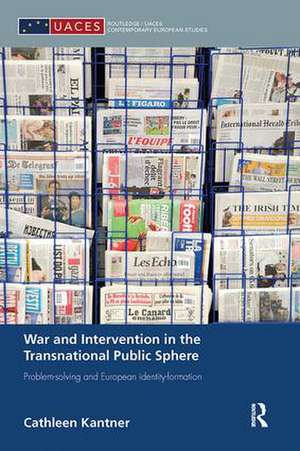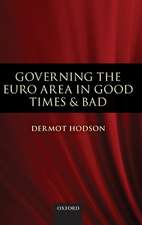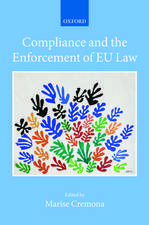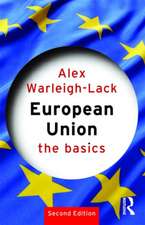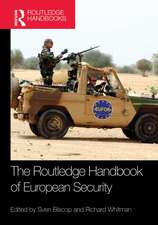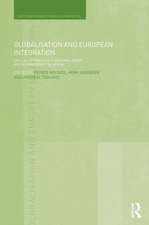War and Intervention in the Transnational Public Sphere: Problem-solving and European identity-formation: Routledge/UACES Contemporary European Studies
Autor Cathleen Kantneren Limba Engleză Paperback – 16 iun 2017
This book contends that public debates over wars and humanitarian military interventions after the Cold War represent an evolving process of comprehension and collective interpretation of new realities. Employing innovative computer-linguistic methods, it examines the dynamics of this debate across Europe and compares it to that of the United States. In doing so, it argues that transnational political communication has shaped European identity-formation in significant ways and that, in trying to come to terms with important crises and institutional events, shared understandings of Europe have emerged. Looking at evidence from a wide range of countries, including Austria, France, Germany, Ireland, the Netherlands and the United Kingdom, and spanning a continuous period of 16 years, this book empirically analyses these shared understandings of the EU as a problem-solving and ethical community.
This book will be of interest to students and scholars of international relations, EU politics, security studies, comparative politics, political communication and European integration.
| Toate formatele și edițiile | Preț | Express |
|---|---|---|
| Paperback (1) | 309.69 lei 6-8 săpt. | |
| Taylor & Francis – 16 iun 2017 | 309.69 lei 6-8 săpt. | |
| Hardback (1) | 699.96 lei 6-8 săpt. | |
| Taylor & Francis – 12 oct 2015 | 699.96 lei 6-8 săpt. |
Din seria Routledge/UACES Contemporary European Studies
-
 Preț: 312.34 lei
Preț: 312.34 lei -
 Preț: 348.15 lei
Preț: 348.15 lei -
 Preț: 310.84 lei
Preț: 310.84 lei - 9%
 Preț: 1005.57 lei
Preț: 1005.57 lei -
 Preț: 393.09 lei
Preț: 393.09 lei -
 Preț: 325.38 lei
Preț: 325.38 lei -
 Preț: 287.68 lei
Preț: 287.68 lei - 18%
 Preț: 945.80 lei
Preț: 945.80 lei -
 Preț: 275.30 lei
Preț: 275.30 lei -
 Preț: 284.52 lei
Preț: 284.52 lei -
 Preț: 464.54 lei
Preț: 464.54 lei -
 Preț: 464.54 lei
Preț: 464.54 lei - 18%
 Preț: 1057.75 lei
Preț: 1057.75 lei - 18%
 Preț: 1055.51 lei
Preț: 1055.51 lei - 18%
 Preț: 703.79 lei
Preț: 703.79 lei - 34%
 Preț: 822.34 lei
Preț: 822.34 lei - 15%
 Preț: 66.82 lei
Preț: 66.82 lei -
 Preț: 413.33 lei
Preț: 413.33 lei -
 Preț: 284.52 lei
Preț: 284.52 lei - 18%
 Preț: 1000.27 lei
Preț: 1000.27 lei - 18%
 Preț: 699.96 lei
Preț: 699.96 lei -
 Preț: 391.57 lei
Preț: 391.57 lei -
 Preț: 460.69 lei
Preț: 460.69 lei - 18%
 Preț: 1065.06 lei
Preț: 1065.06 lei -
 Preț: 464.54 lei
Preț: 464.54 lei -
 Preț: 315.29 lei
Preț: 315.29 lei - 18%
 Preț: 1054.71 lei
Preț: 1054.71 lei -
 Preț: 483.49 lei
Preț: 483.49 lei -
 Preț: 411.64 lei
Preț: 411.64 lei - 12%
 Preț: 312.43 lei
Preț: 312.43 lei - 26%
 Preț: 850.59 lei
Preț: 850.59 lei - 18%
 Preț: 1060.11 lei
Preț: 1060.11 lei - 15%
 Preț: 701.45 lei
Preț: 701.45 lei -
 Preț: 440.21 lei
Preț: 440.21 lei -
 Preț: 386.51 lei
Preț: 386.51 lei -
 Preț: 462.60 lei
Preț: 462.60 lei
Preț: 309.69 lei
Nou
Puncte Express: 465
Preț estimativ în valută:
59.26€ • 62.04$ • 49.03£
59.26€ • 62.04$ • 49.03£
Carte tipărită la comandă
Livrare economică 05-19 aprilie
Preluare comenzi: 021 569.72.76
Specificații
ISBN-13: 9781138309906
ISBN-10: 1138309907
Pagini: 202
Ilustrații: 20
Dimensiuni: 156 x 234 x 11 mm
Greutate: 0.45 kg
Ediția:1
Editura: Taylor & Francis
Colecția Routledge
Seria Routledge/UACES Contemporary European Studies
Locul publicării:Oxford, United Kingdom
ISBN-10: 1138309907
Pagini: 202
Ilustrații: 20
Dimensiuni: 156 x 234 x 11 mm
Greutate: 0.45 kg
Ediția:1
Editura: Taylor & Francis
Colecția Routledge
Seria Routledge/UACES Contemporary European Studies
Locul publicării:Oxford, United Kingdom
Public țintă
Postgraduate and UndergraduateCuprins
1 Introduction: Transnational Political Communication and European Identity-Formation 2 The Theoretical Building Blocks: Transnational Identity Discourses on Wars and Humanitarian Military Interventions 3 Media and Media Analysis in Europe 4 Comparing Debates on Wars and Humanitarian Military Interventions across Nations 5 Reality and Identities ‘Under Construction’
Notă biografică
Cathleen Kantner is Professor of International Relations and European Studies at the Institute of Social Sciences of Stuttgart University, Germany.
Recenzii
Cathleen Kantner has offered a remarkably conceptually rich and empirically rigorous examination of sense and identity making in humanitarian interventions in the post-Cold War world. This book is a major contribution to the international relations constructivist corpus. Yet beyond this important contribution, Kantner’s book should be read by political communication scholars who are interested in war, media, and global affairs. Steven Livingston, The George Washington University, USA.
Conventional wisdom has it that Europe does not constitute a community of communication with regard to wars and humanitarian interventions. Yet, Cathleen Kantner demonstrates that transnational European public spheres exist even with regard to war and peace. The book is based on the largest database on transnational communication so far and employs new methodological tools such as corpus-linguistic quantitative content analysis. A must-read for anybody interested in transnational communication! Thomas Risse, Freie Universität Berlin, Germany.
An excellent addition to comparative political communication. Kantner contributes significant theoretical concepts, methodological innovations and empirical evidence on debates in Europe and the U.S. on war and humanitarian intervention. The provocative analysis of "transnational political communication" and "European identity-formation," is very useful for any future research in these areas. Eytan Gilboa, Bar-Ilan University, Israel.
Conventional wisdom has it that Europe does not constitute a community of communication with regard to wars and humanitarian interventions. Yet, Cathleen Kantner demonstrates that transnational European public spheres exist even with regard to war and peace. The book is based on the largest database on transnational communication so far and employs new methodological tools such as corpus-linguistic quantitative content analysis. A must-read for anybody interested in transnational communication! Thomas Risse, Freie Universität Berlin, Germany.
An excellent addition to comparative political communication. Kantner contributes significant theoretical concepts, methodological innovations and empirical evidence on debates in Europe and the U.S. on war and humanitarian intervention. The provocative analysis of "transnational political communication" and "European identity-formation," is very useful for any future research in these areas. Eytan Gilboa, Bar-Ilan University, Israel.
Descriere
This book contends that public debates over wars and humanitarian military interventions after the Cold War represent an evolving process of comprehension and collective interpretation of new realities. Employing innovative computer-linguistic methods, it examines the dynamics of this debate across Europe and compares it to that of the United States. In doing so, it argues that transnational political communication has shaped European identity-formation in significant ways and that, in trying to come to terms with important crises and institutional events, shared understandings of Europe have emerged. Looking at evidence from a wide range of countries, including Austria, France, Germany, Ireland, the Netherlands and the United Kingdom, and spanning a continuous period of 16 years, this book empirically analyses these shared understandings of the EU as a problem-solving and ethical community.
